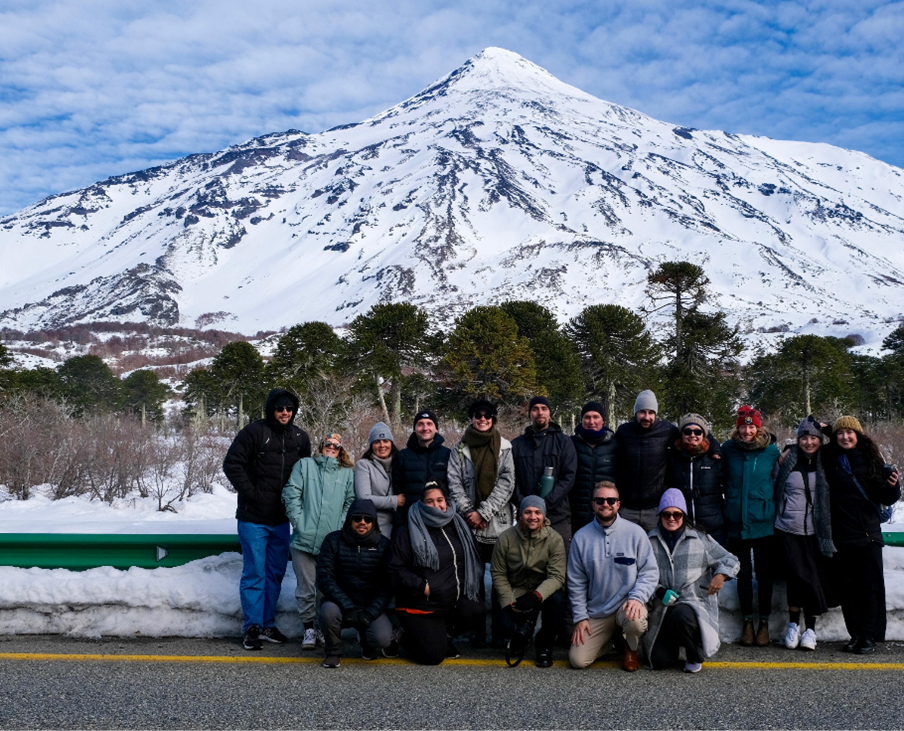Winds of Change: Chile delegation

24 June 2024
A Winds of Change (WoC) delegation recently visited Chile to learn about the impact of climate change in Chile, understand relevant key policies and strategies in Chile and dialogue on existing and possible new solutions to climate change challenges. Important strategic contexts for our visit include the National Adaptation Plan for Climate Change in New Zealand and the Framework Law on Climate Change in Chile.
The delegation led by our Deputy Director, Craig Nicholson, comprised 12 WoC alumni that are professionals and researchers in the early- mid phase of their careers from the Winds of Change Latin America and North Asia Programmes, including WoC alumni based in Chile. Other members of the delegation included academics, a government representative from the Ministry of Primary Industries and members of our University of Otago Winds of Change team and the Latin America CAPE.
The Chile visit programme was designed around the Winds of Change themes: science and science communication, public policy, sustainable business and indigenous perspectives on climate change.
Chile is a highly relevant country for New Zealand to be working with on climate change given our shared geographical location at the bottom of the world, similar climate change impacts and the long-standing diplomatic, academic and people to people relationships between our two countries. In addition, Chile has ambitious goals for its energy transition and is committed to achieving carbon neutrality by 2050, with the supply of 80% of the energy mix to come from renewables in 2030 and 65% in 2025. Chile’s Framework Law also includes goals and targets in other sectors such as reducing emissions from industry and mining by 70%, and emissions from transport by 40% by 2050. Such initiatives contribute to Chile being a leader globally and in Latin America on climate change initiatives, being the top country in Latin America on The Climate Change Performance Index 2024, and eleventh globally.
Chile’s significant developments in renewable energy are also of great interest to New Zealand. For example, significant wind farms and solar energy plants with Chile having the first thermo-solar plant in Latin America, and the largest wind farm in Latin America currently under construction. In addition, Chile is developing significant green hydrogen plants around the country as an alternative and sustainable fuel source.
Learning, relationships and practical experiences in Chile for our Winds of Change delegation were rich and varied. Warm welcomes from all our hosts made any perceptions of cultural differences melt away quickly, aided and abetted by large quantities of delicious Chilean food, including the by-end-of trip favourite ‘sopaipillas’ (fried dough made with pumpkin).
Peak moments included two Winds of Change Symposiums: in the capital Santiago on Climate Science, Public Policy, Innovation and Business (organised with the Universidad de Chile and the New Zealand Embassy team in Santiago, and included the participation of the Minister for the Environment, Maisa Rojas, for example); and in the south in collaboration with the Universidad de la Frontera (UFRO) in Temuco on “Confronting challenges from the Global South: innovative solutions from Chile and New Zealand”.
The range of people and topics covered at both symposiums were impressive, with our delegates participating in a range of panels with Chilean academic and private sector specialists. For example, Climate Research and Cooperation between Chile and New Zealand, Adaptation to Climate Change and Indigenous Peoples, South-South cooperation and the role of public policies, plus innovation and sustainable development.
We also had a fun and incisive networking session with researchers, academics and students at the Universidad de Chile CR2 Centre for Climate and Resilience Research, including a focus on IPCC (The Intergovernmental Panel on Climate Change) challenges.
Please see here for a video of the Symposium at the Universidad de Chile (in Spanish), and a video report on the Symposium at UFRO here (also in Spanish).
Experience in the south of Chile of relevant climate change strategies and initiatives at a regional level in addition to Santiago was critical for our group. This was especially important in such a centralised country as Chile and to also seek indigenous-first perspectives from Mapuche, one of Chile’s eleven indigenous peoples and the largest First Nations Group in the country. A visit to Kurarewe up in the Andes mountains was particularly inspiring. Here we learned from a Mapuche leader from the relevant lof (territory) about an agreement being developed with the Chilean government on the use, conservation of and co-governance of the Villarrica National Park.
Visits to business organisations and NGOs brought climate change theory, research and real-world challenges and solutions to the fore. Caroline Urmeneta from the Global Methane Hub gave a master class in relevant climate change policies, strategies and data in Chile, including greenhouse gas emissions. A number of Chilean businesses that were at COP 28 in Dubai showcased solutions to climate change challenges. We also saw how Santa Rita vineyards have actioned one of the most successful sustainability strategies in Chile. WWF Chile has collaborated with the regional government in Metropolitan region on action planning workshops with local government teams. We experienced wonderful initiatives in Peñalolén and how the municipality is enabling change and mitigation of climate change at neighbourhood level. We were hosted by the Mayor of Renca, Claudio Castro for our final visit of the trip. Claudio and his team showed how they are using science and high-quality data to inform and monitor their climate change strategy, and a reforestation and community regeneration project in Renca. Truly a high note to end our visit.
The trip was a transformative experience for our entire delegation and has created enduring relationships and opportunities for universities, the Winds of Change network, researchers, government organisations and businesses.
Our deep and heartfelt thanks to our hosts from the business, academic, government, community and NGO sectors, and to the Universidad de Chile, Universidad de la Frontera and the New Zealand Embassy team in Santiago and the Sustainability Centre at the Universidad Católica in Villarrica.
¡Viva Chile! ¡Viva New Zealand! ¡Viva Winds of Change!
Latin America CAPE







